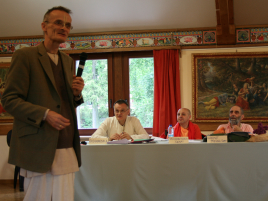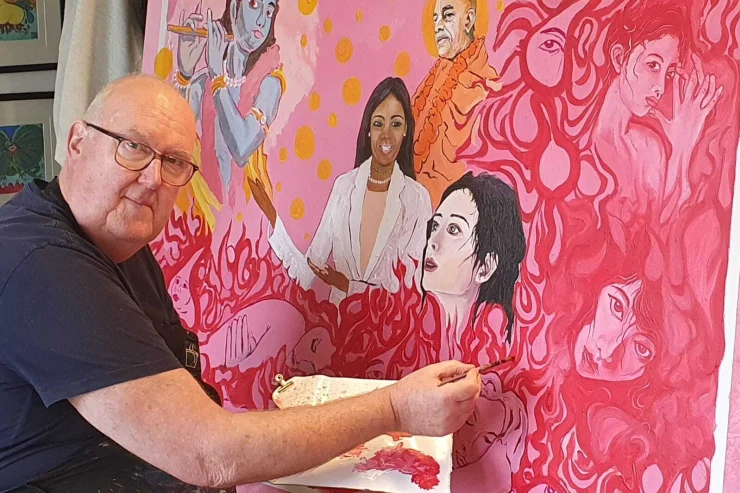ISKCON Educators Find Unity at Second Annual Conference
By Madhava Smullen | Июн 12, 2013

Last year, ISKCON educators came together to hold the society’s first international educational conference in fifteen years.
Its success ensured its place as an annual staple. And sure enough from May 28th to 30th this year, the second annual conference, entitled The Role of Education in ISKCON’s Strategic Planning, was held in Radhadesh, Belgium.
Twenty-eight delegates representing thirteen educational initiatives in eight different countries attended. Some of the initiatives represented were ISKCON Educational Services in the UK, Bhaktivedanta College in Hungary, Bhaktivedanta Mission School in India, Goloka Education in New Zealand, and of course Bhaktivedanta College in Belgium.
Delegates also hailed from such varied countries as the US, Germany, and Ghana.
Each day of the conference began with the traditional morning program at the Radhadesh ISKCON temple.
In place of the regular morning class, local community members and conference attendees alike were treated to special Srimad Bhagavatam classes with an educational theme.
The conference proper began on Thursday May 28th at 12:00pm with a welcome and orientation speech by Bhaktivedanta College principal Yadunandana Swami. Saying that the conference was made possible only by the combined efforts of many devotees, he gave some of its history.
Initiated in 2012 by the European Ministry of Educational Development, and Bhaktivedanta College, the conference was intended to create unity and cooperation amongst ISKCON educational initiatives and educators, he said.
A Keynote Speech by veteran ISKCON educator Urmila Dasi followed. Stating that education should be relevant and relatable, she emphasized that we must preserve the core teachings introduced by our acharyas, while being innovative enough to reach modern day students.
Next Rasamandala Das, course director for Bhaktivedanta College’s new Educational Studies, Theology and Religion degree, presented Education: A Contested Enterprise.
In the presentation, he spoke about reinforcing the importance of education in ISKCON, citing the first of Srila Prabhupada’s seven purposes for his society: To systematically propagate spiritual knowledge to society at large and to educate all people in the techniques of spiritual life.
Rasamandala also strongly pointed out that it was an absolute necessity to have cooperation between educators and ISKCON administrators. And he discussed the need for educational literacy as a common ground language.

The next day of the conference, Wednesday May 29th, began with reports from four teams established at last year’s conference: 1) Promoting the academic study of education within ISKCON, 2) Career Development and Guidance, 3) Collaboration between ISKCON Primary and Secondary Schools, and 4) Adult and Shastric Education in ISKCON.
Speaking for Adult and Shastric Education, Yadunandana Swami reported that there are thirty-two ISKCON centers currently offering systematic study courses such as Bhakti Sastri and Bhakti Vaibhava, and that more are in the process of becoming accredited to do so. However, he also expressed the need to make scriptural study courses available not just to temple residents, but also to devotees living and working outside of temples.
In primary and secondary education, delegates heard about Goloka Education’s creation of a Sanskrit curriculum. Meanwhile for Career Development, Abala Dasi reported on helping Bhaktivedanta College graduates find a career path. She also laid out plans for a new website which will list job vacancies, and provide training in resume writing and interview skills.
Her husband Rasamandala Das then spoke on promoting the academic study of education within ISKCON and developing a philosophy of education. An open discussion ended with the conclusion that several different philosophies of education may be needed in ISKCON depending on the type of educational institution, but that all should have a common ground.
Next, several delegates presented Principles Underpinning Successful Projects, beginning with Maharani Dasi and her presentation on Bhaktivedanta College Hungary. The College offers the only accredited yoga degree in Europe, has hundreds of students from the public enrolling every year and considering themselves Krishna devotees by the end of the program, and plans to to introduce degrees in English as well as Hungarian soon.
Krishna Ksetra Das, Dean of Bhaktivedanta College Belgium, said that in its eleven years of operation, BC has taught students from thirty-two countries. He spoke about BC’s two degrees, Theology and Religious Studies, and Educational Studies, Theology and Religion, both accredited by Chester University in the UK. He spoke about plans to introduce more online courses. And he talked about how so many of Bhaktivedanta College’s students are second generation ISKCON devotees, and about the Career Development team’s plans to help them.
Following on from this was a group work entitled Empowering Our Second Generation. Delegates were divided into seven groups, each with one second generation member. They were then given various questions to answer, such as what is the importance of education in ISKCON? And what are the results of successful education? Groups were encouraged to listen to the experience and opinions of their second generation members.
Next, conference attendees could choose one of three different “interactive practical sessions” to attend.
Option one, Education for Ecstasy with Hanumat Presaka Swami focused on education and its ultimate goal, love of Krishna. Option two, Vedic Education in a Contemporary Context with Prana Das, explored issues such as the challenge of educating our children in the 21st century. And in option three, The Role of Education in Mahaprabhu’s Movement: Entering Now Into the Golden Age, Urmila Dasi guided delegates in developing models for spiritual success.
On Thursday May 30th, the last day of the conference, several delegates had the chance to present their projects in “Showcase Time.”
Hanumatpresaka Swami of the North American Institute for Oriental and Classical Studies said the educational isntitution was one of the fastest growing and most original in North America. He also talked about its plans to introduce a Master’s Degree in literature.
Indriyesha Das of ISKCON Educational Services at Bhaktivedanta Manor and Newcastle in the UK recounted how he and his staff visit 200 schools annually and present Krishna consciousness to around 400,000 children in a fun way. The children dress up, hear stories, learn some philosophy, and do kirtan. 160 out of the 200 schools also visit the Manor for a tour, including a bullock cart ride, face painting, kirtan, and questions and answers.
Next, Krishna Ksetra Das announced the upcoming ISKCON Studies Conference from October 19th to 21st at Radhadesh. Held to commemorate the 100th year since Vaishnava saint Bhaktivinode Thakur’s passing, it will give Brahmins and theologians a chance to gather and share ideas.

Radhika Ramana Das, Associate Professor of Religious Studies at the College of William and Mary in Virginia, spoke next. Radhika Ramana, who was homeschooled by his mother Aruddha Dasi, presented her book Homeschooling Krishna’s Children, which guides devotee parents who are interested in taking this path. He also spoke about her seminars and yahoo groups on homeschooling, which he and his brother Gopala Hari help run.
Next Urmila Dasi presented her Learn to Read series of Krishna conscious readers. She demonstrated the smartphone app of her book Did Krishna Do It?, and mentioned that it could be purchased from the Apple Store in English, Hindi and Gujarati.
Prana Das, meanwhile, presented a series of books and resources developed by Goloka Education to learn Sanskrit. These included a dictionary, student book, teacher’s guide book, cards, and games. Rama Giridhari, also from Goloka Education, then presented his idea for a blog that would facilitate networking and sharing by ISKCON teachers.
After the Showcase, Sesa Das presented Current Strategic Planning in ISKCON, explaining how education will be a big part of ISKCON’s new strategic plan. The delegates were then divided into groups for an interactive exercise in which they presented their own strategic plans for pushing foward education in ISKCON.
Common suggestions found in all these plans included defining a global vision and strategy for ISKCON education, and establishing a resource center where educators could avail of previously gathered information.
At last, in the final plenary session, delegates summed up the conference.
“The final session was very inspiring,” says Bhaktivedanta College alumni Syama Sakhi Dasi, who attended the conference and took notes. “Even though it seemed like there was so much to do, it was very clear what the next steps are for education in ISKCON. The four groups focusing on academic study of education, career development, primary and secondary schools and adult and sastric education will continue with their work. Regional directors for the groups will be officially established. A philosophy of education will be worked on and presented at next year’s conference. And clear communication will be established between the Ministry of Education and those working on the ground as educators.”
After the conference, all delegates were presented with gifts, and everyone exchanged appreciation notes. Many then attended the eleventh graduation ceremony for Bhaktivedanta College students later that evening, along with college staff and Radhadesh community members.
They then returned home to their individual projects, inspired, refreshed and excited about next year’s conference.
“The conference especially inspired me because there was such a variety of devotees coming from different parts of the world and different educational institutes,” says Syama Sakhi. “But they all came together with open hearts and minds to learn from each other, help each other, support each other, and share their successes. One could feel the unity in diversity. And that was very inspiring.”















